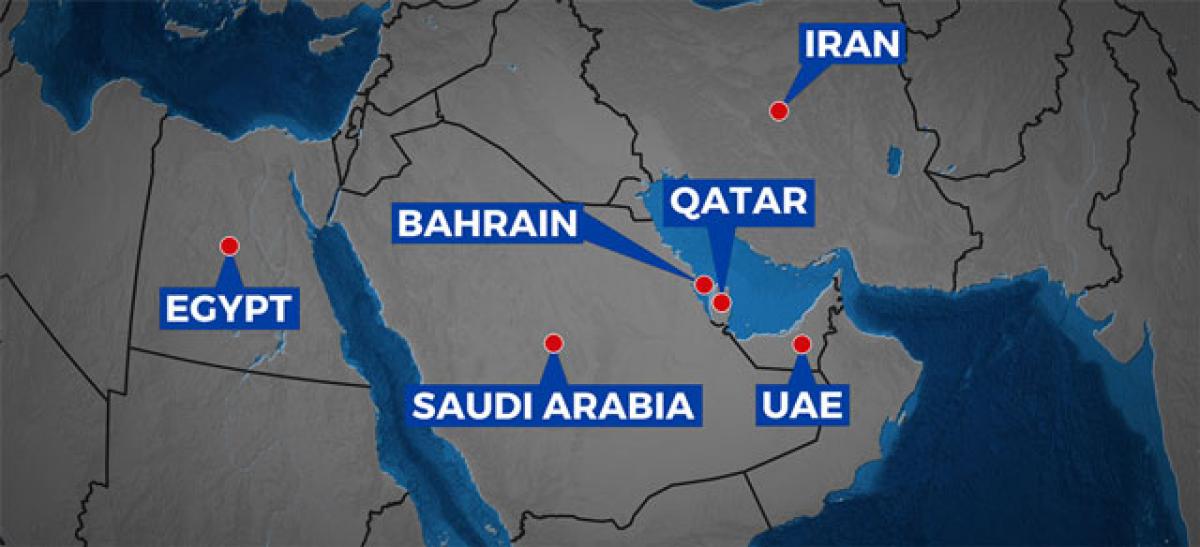Live
- Boxing Day Test Weather Forecast: Rain Delays Expected on Day 3 and Day 4 in Melbourne
- Baby John Twitter Reviews: Varun Dhawan Impresses, But Fans Feel the Remake Lacks Theri's Charm
- Pakistan Air Strikes Kill 46 in Afghanistan, Taliban Confirms Amid Rising Tensions
- ACB Launches Investigation into Formula E Races Held in Hyderabad Last Year
- Mega Job Mela in Madhapur on December 28: Explore Employment Opportunities in Hyderabad
- New Mizoram Guv likely to take charge next week
- Barroz 3D Movie Review: A Visual Treat for Mohanlal Fans, Mixed for Others
- Donate Blood, Save Lives: BJP Hosts Mega Blood Donation Camp in Aiza
- Azerbaijani Airliner Crashes Near Aktau, Kazakhstan: 32 Survive, Over 30 Feared Dead
- Union Minister Bandi Sanjay Kumar to Visit Jogulamba Gadwal District on December 27, 2024
Just In

These developments are likely to have significant implications for India, given that its citizens make up the largest expatriate group in the region. Prime Minister Narendra Modi\'s government has strengthened India’s ties with Saudi Arabia, Iran, UAE, Qatar and Israel.
The Persian Gulf region was shaken by a massive political earthquake on June 5, 2017 when four Arab countries – Saudi Arabia, United Arab Emirates (UAE), Bahrain and Egypt – announced that they were severing all political, economic and diplomatic links with Qatar, a member of the Gulf Cooperation Council (GCC). The four countries were soon joined by Libya, Yemen and even Maldives. However, Kuwait and Oman, the remaining two members of the GCC, refused to follow the lead of Saudi Arabia in this regard…
The Qatar crisis and India
These developments are likely to have significant implications for India, given that its citizens make up the largest expatriate group in the region. Prime Minister Narendra Modi's government has strengthened India’s ties with Saudi Arabia, Iran, UAE, Qatar and Israel. This demonstrates a more self-assured approach by India in handling the growing opportunities and challenges in the region.
There are around seven million people of Indian origin working in the Middle East. Security and stability in the region is hence of paramount importance for India. Further, the Indian diaspora in the region remits around $40 billion a year. These funds are immensely valuable as they help India manage its current account deficit. Energy is another critical area of engagement. A fifth of India’s oil, and about 65 per cent of gas imports, comes from countries of the Middle East including Iran, Qatar, Iraq, Saudi Arabia and others.
External Affairs Minister Sushma Swaraj, speaking on June 5, 2017 even as the above mentioned developments in the Gulf were unfolding, asserted that this is an intra-GCC affair and will not have a significant impact on India or on Indians resident in that country or in the region. This appears to be a somewhat simplistic reading of the situation. Or possibly, the full dimensions of the issue were not understood at the beginning of the crisis.
It is true that travel for Indians to Qatar is unlikely to be affected as flights from India take the Persian Gulf route to Doha. The limits placed on air space access by the Saudi-led grouping will therefore not have any significant impact over the Persian Gulf. Difficulties will, however, be experienced by Indians resident in Qatar and wishing to travel to other Gulf countries or those resident in other Gulf nations wanting to visit Qatar.
India is the third largest export destination for gas from Qatar (behind Japan and South Korea). Qatar is the largest supplier of LNG to India, accounting for over 65 per cent of India’s global import and 15 per cent of Qatar’s export of LNG…And in case the crisis gets prolonged, prices of food items and essential commodities in Qatar could increase and affect the lives of 650-to-700,000 Indians.
This could also affect remittances. A prolonged crisis could result in increased insecurity, reduced economic activity and stress on the 50 per cent or so of the total inward remittances that India receives from the Gulf. Any confrontation or uncertainty in Qatar or the wider Gulf region can have serious adverse implications for India.
Beyond a point, India cannot stay aloof. Given the range, expanse and depth of India’s interests and its rapidly expanding political, economic and strategic profile, sooner or later India will have to get more vigorously engaged in dealing with developments in this crucial region.
In the coming years, India will have to adopt a more hands on policy in any security crisis or economic upheaval that may strike the region because its own security, economic well-being, and energy needs are all closely interlinked with this region. India enjoys good relations with all countries of the region. That should facilitate India playing a more agile and vigorous role in the region. (Excerpts from article at www.idsa.in; Sajjanhar is President, Institute of Global Studies)
By Ashok Sajjanhar

© 2024 Hyderabad Media House Limited/The Hans India. All rights reserved. Powered by hocalwire.com







